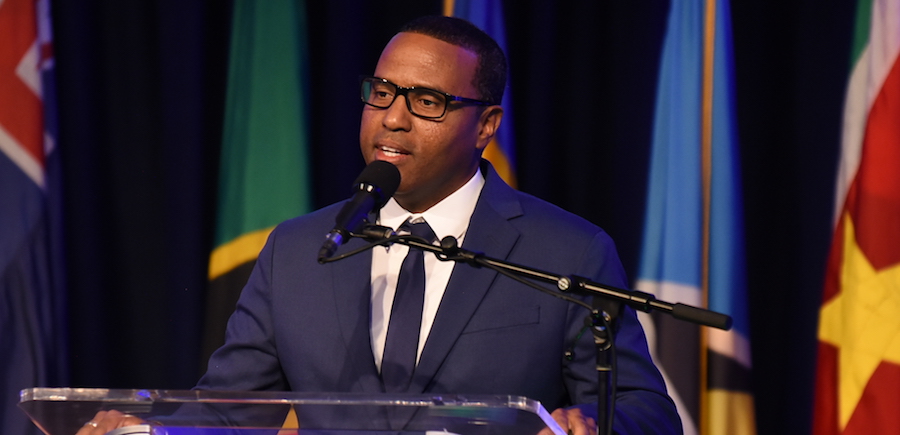Two Caribbean economists believe that the region must join forces now to buy 20 million vaccine doses or the pandemic “will continue to devastate our lives and economies for another two years”.
Economic consultant Dr Justin Ram and economist and social entrepreneur Kiran Mathur Mohammed, who in a joint article explained that with some 18.5 million people in the Caribbean Community (CARICOM), to achieve herd immunity would require the region buying enough vaccine for 90 per cent of the population, factoring in spillage, usage, and holding some for future use.
“That means ordering at least 150 per cent of what we need – at least 19.4 million vaccines,” they said.
Pointing out that the measures implemented by countries over the past several months to protect residents have resulted in job losses, school closures, and triggered domestic violence, abuse and mental health crises, the duo said it is time the region “escapes from this constant, crippling cycle of lockdowns and fear and get people back to work so we can start adjusting to our new post COVID-19 lives”.
“The vaccine is the only way,” they added.
Barbados and other developing countries are hoping to receive vaccines from the global vaccine programme for developing countries called the COVAX Facility. The amounts to be received should be enough for about 20 per cent of the population and will be spread out over the year.
In addition, Barbados has already sourced 100, 000 vaccine doses, enough for 50, 000 people, with two doses required. Government has also indicated that efforts were being made to source vaccines through other means.
Stating that the efforts that countries were making was “good”, the economists pointed out that there was still stiff competition to obtain the vaccines “and the simple market reality is that smaller players have less clout”.
“Counter-intuitively, it is actually easier to produce a larger order than a smaller one,” they added.
“We will only land vaccines and achieve herd immunity in the next few months if CARICOM pre-orders vaccines now from candidates who World Health Organisation approval is expected in the next month or two. Larger numbers or other countries are already taking this approach. We must do so or we will end up living like this until 2023,” they warned.
Ram, a former director of economics at the Caribbean Development Bank, and Mohammed, a co-founder of medl, an Inter-American Development Bank-backed social impact health tech company, pointed out that the region was in a position to pool financial resources to access the vaccine needed for the region.
They calculated that with an cumulative annual gross domestic product (GDP) of US$91.5 billion, and with vaccines ranging between US$4 and US$37 per dose, the region would only have to spend about US$1 billion or 1.2 per cent of the region’s total GDP.
“If we assume that COVAX will provide enough vaccines for 20 per cent of our population in 2021, and that we need to vaccinate 90 per cent of our population, that means 13 million people still need to be vaccinated. Multiplied by 150 per cent, that makes 19.4 million vaccines”.
“With vaccines ranging between US$4 and US$37 per dose and with most vaccines requiring two doses, if we take the medium price of US$21 per dose multiplied by two doses and we add 30 per cent for transport, storage and the cost of procurement, the total cost to inoculate one person is about US$55. US$55 multiplied by 19.4 million people is just over US$1 billion 1.2 per cent of total Caribbean GDP,” the economists explained in the document that was shared with Barbados TODAY.
Suggesting that the allocation of the cost would best be done by population size, they said however, this would leave Haiti, the poorest of the CARICOM nations, with the largest bill of about US$652 million given its population size.
“A better allocation formula would be by share of GDP, to spread the burden,” they proposed. They added, “Trinidad and Tobago’s bill under this would be US$251 million, just 3.4 per cent of its national budget. Jamaica’s would be less – US$182 million, while Barbados and Guyana would pay US$464 million each.”
“This is a vast return, considering COVID-19 cost Trinidad and Tobago alone a conservative US$1.3 billion last year alone,” they pointed out.
In the document, Ram and Mohammed proposed that to fund this, CARICOM states could collectively raise a bond for US$1 billion and split the repayment bond between countries, based on their share of GDP.
“Bond repayments can also be funded by, for example, an increase in common external tariff rates on certain products, incentivizing local industries,” they explained.
Adding that the region must come to terms that “the countries that have done well with COVID-19 are most aware that the world is a competitive place”, the economists said the Caribbean’s most competitive asset, whether for nation building, commerce or sports, is its human capital.
They added: “Our people’s welfare must come before every other priority. CARICOM must come together and act now.” (marlonmadden@barbadostoday.bb)




